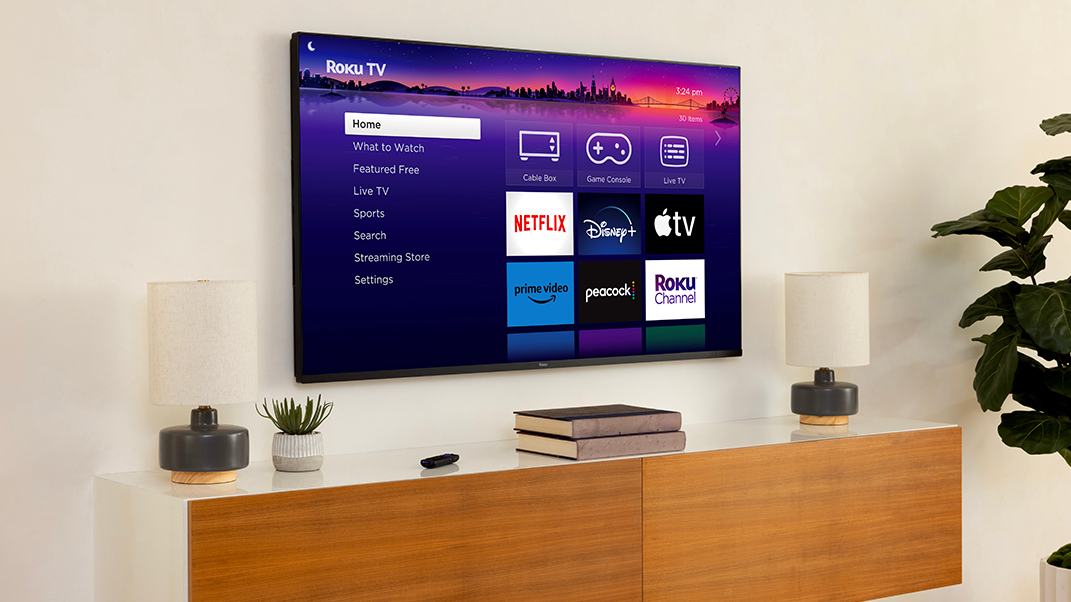Roku's idea to increase ads involves taking over your console or streaming stick
Roku's latest patent wants to take your Xbox or Apple TV to Roku City

The latest hi-fi, home cinema and tech news, reviews, buying advice and deals, direct to your inbox.
You are now subscribed
Your newsletter sign-up was successful
Popular streaming stick and TV manufacturer Roku appears to have big plans for ramping up the amount of advertising you see on its TVs. According to recent reports, the streaming giant has submitted a patent that will allow it to take over your HDMI feed to show you advertisements even when using external sources such as a console, Blu-ray player or set-top box.
The company has already expanded upon the ways it can deliver sponsored content to its audiences through its popular "Roku City" screensaver. The idle animation that plays when you leave your Roku streaming device idle went somewhat viral within the last year, as many social media users expressed their admiration for the animated city skyline and cosy sunset backdrop.
Roku quickly picked up on it and began renting out advertisement space within its digital metropolis to the likes of McDonalds and Walmart in the US, as well as promoting recent movie premieres that you could buy and rent on its services, such as Barbie.
This has clearly been a successful venture for Roku, as the company has blocked developers from bypassing its idle screensavers within their apps. For example, the Netflix app often shows content suggestions if you leave it running on other smart streaming devices, but Roku's screensaver will override this if you're using a Roku TV or streamer.
However, this only works with apps running natively on Roku hardware, meaning any device connected to a Roku TV over HDMI will display its own screensaver; for example, the Xbox's idle state that shows achievement progression, or the Apple TV 4K's stunning selection of world videography. So how can Roku capitalise on devices connected over HDMI? Its latent patent might address this.
According to Janko Roettgers at Lowpass (via Kotaku's Zack Zwiezen), Roku has filed a patent that will supposedly insert its own sponsored content over the idle display featured on your HDMI device. You can view the patent here, which explains how Roku plans on implementing this.
The obvious concern is that Roku doesn't have the same level of control over HDMI devices as it does over its own integrated smart platforms. If ads suddenly popped up mid-game on a user's Xbox, or mid-movie on an Apple TV 4K, that would be a sure-fire way to displease Roku TV users.
The latest hi-fi, home cinema and tech news, reviews, buying advice and deals, direct to your inbox.
Roku plans to circumnavigate this by grabbing frames from an HDMI feed to compare differences; if there are none then it's likely that a user has paused their game or film. But what if the film or game has a freeze-frame moment? Roku has supposedly suggested monitoring audio feeds to identify prolonged silences, which will further identify if a user has paused their game or film. This will likely be backed by HDMI CEC, a feature found on many soundbars, AVRs, Blu-ray players and game consoles that allows for smoother integration between HDMI-connected devices and TVs.
Furthermore, Roku has considered how to make the advertisements relevant to users by identifying what the user is watching or playing. Roku will reportedly use audio and visual content recognition systems (using an industry-standard known as ACR) that will match whatever is on the screen to a database of advertising information. Even if the content isn't related to anything on Roku's database, it will still be valuable knowing that the user is a gamer, for example, as Roku will then be able to show more generalised (but still focused) advertisements for that demographic.
While there is no guarantee that Roku will implement this system into its TVs (after all this patent seems to have first been filed in 2022), we're already apprehensive of Roku's idea for inescapable ads.
MORE:
Read our full Roku Streambar review
Roku accounts hacked: check if yours is one of them
Check out our picks for the best media streamers
Lewis Empson is a Senior Staff Writer on What Hi-Fi?. He was previously Gaming and Digital editor for Cardiff University's 'Quench Magazine', Lewis graduated in 2021 and has since worked on a selection of lifestyle magazines and regional newspapers. Outside of work, he enjoys gaming, gigs and regular cinema trips.
